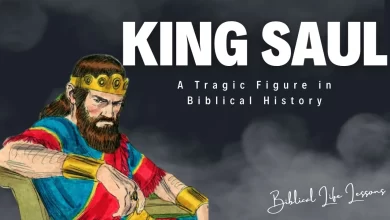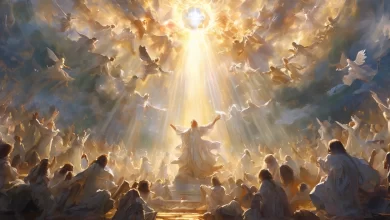Introduction
In a world where historical narratives are often interwoven with the fabric of faith and culture, few stories are as profound and comprehensive as those of the 12 tribes of Ishmael and Israel. These stories are not mere collections of past events; they are the foundations upon which civilizations, traditions, and identities have been built that endure to this day. To understand the true essence of these stories, one must delve into the ancient origins, divine promises, and lives of the patriarchs who began these lineages.

The story begins with Abraham, a man whose faith and obedience to God made him a central figure in Jewish, Christian, and Islamic traditions. Originally known as Abram, Abraham is revered as the father of many nations, a man who established a covenant with God that would reverberate through the ages. His journey is marked by challenges, trials, and, above all, by unwavering faith.
The central narrative of these tribes begins with the complex relationship between Abraham, his wife Sarah, and Hagar, Sarah’s Egyptian servant. Sarah, unable to conceive a child, makes a decision that would change the course of history: she offers Hagar to Abraham so that he might have an heir. Thus, Ishmael is conceived, but this solution does not come without conflict and tension. Sarah, upon realizing that Hagar is pregnant, treats her harshly, leading her to flee into the desert. It is at this moment that an angel of the Lord appears to Hagar, prophesying the birth of Ishmael and his descendants, ensuring that he would become a great nation.

Abraham, Sarah and Hagar – The Patriarchs and the Roots of Discord
Abraham, the father of nations, was a man of deep faith and obedience. His journey began in Ur of the Chaldees, where he received a divine call to leave his homeland and set out for an unknown land, which God promised to give to him and his descendants. Abraham, then called Abram, obeyed without hesitation, taking with him his wife Sarah and his nephew Lot.
Sarah, originally called Sarai, was barren, which became a source of anguish and uncertainty for the couple. God’s promise of a large offspring seemed impossible given the reality of their condition. However, God renewed his promise to Abraham, assuring him that he would be the father of many nations. But time passed, and Sarah, now advanced in age, realized that the divine promise had not yet been fulfilled.
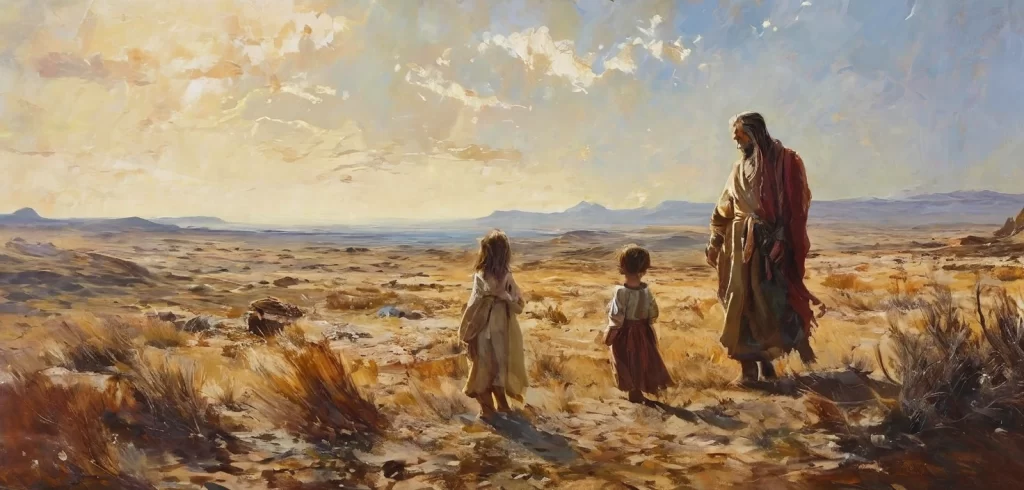
In an act of desperation and hope, Sarah makes a decision that would change the course of history. She offers her Egyptian servant, Hagar, to Abraham so that he can have a son through her. Hagar conceives, and Ishmael is born. However, the joy of Ishmael’s birth is overshadowed by the tensions that arise between Sarah and Hagar. Sarah, upon seeing her servant pregnant, begins to treat her harshly, causing Hagar to flee into the desert.
It is at this critical moment that an angel of the Lord appears to Hagar, prophesying that her son will become the father of a great nation. The angel says, “I will multiply your descendants beyond counting, so that they will be countless” (Genesis 16:10). Hagar, encouraged by the angel’s words, returns to Abraham’s home, and life goes on.
Some time later, God appears to Abraham again, renewing his promises and announcing that Sarah, despite her advanced age, will give birth to a son. Sarah, upon hearing the promise, laughs in disbelief, but God confirms that nothing is impossible for him. Thus, Isaac is born, and the joy of his birth is a testimony to the fulfillment of the divine promise.
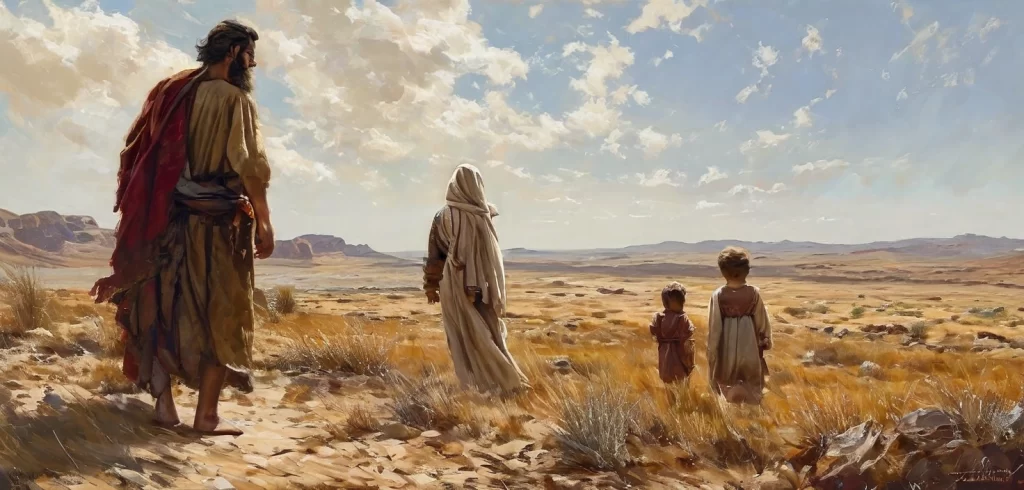
The Birth of Isaac and the Expulsion of Ishmael
The birth of Isaac is a milestone in the history of divine promises. He is the son of promise, the one through whom God would establish his covenant. However, the presence of Ishmael and his mother Hagar continues to be a source of tension. Sarah, fearing that Ishmael might compete with Isaac for Abraham’s inheritance, demands that Hagar and Ishmael be expelled.
Abraham, reluctant to expel his son, seeks God’s guidance. God, however, assures Abraham that He will make Ishmael a great nation, but that the covenant will be established through Isaac. With a heavy heart, Abraham sends Hagar and Ishmael into the wilderness with only a few supplies.
In the wilderness, Hagar and Ishmael face hunger and despair. Hagar, in her anguish, places Ishmael under a bush and walks away, unable to bear to see her son die. But God, faithful to His promise, hears Ishmael’s cry and sends an angel to comfort Hagar, assuring her that God will make Ishmael a great nation. God opens Hagar’s eyes to a well of water, and mother and son are saved.
The 12 Tribes of Israel – The Promise Fulfilled
The story of Isaac is marked by the fulfillment of divine promises. He marries Rebekah, and the couple has twins: Esau and Jacob. Jacob, the youngest, is chosen by God to continue the lineage of promise. He has 12 sons, each of whom will become the patriarch of one of the 12 tribes of Israel.
The 12 tribes of Israel are: Reuben, Simeon, Levi, Judah, Issachar, Zebulun, Dan, Naphtali, Gad, Asher, Joseph and Benjamin. Each tribe has its own history, characteristics and destiny, but they are all united by the divine promise and the common heritage of Abraham, Isaac and Jacob.
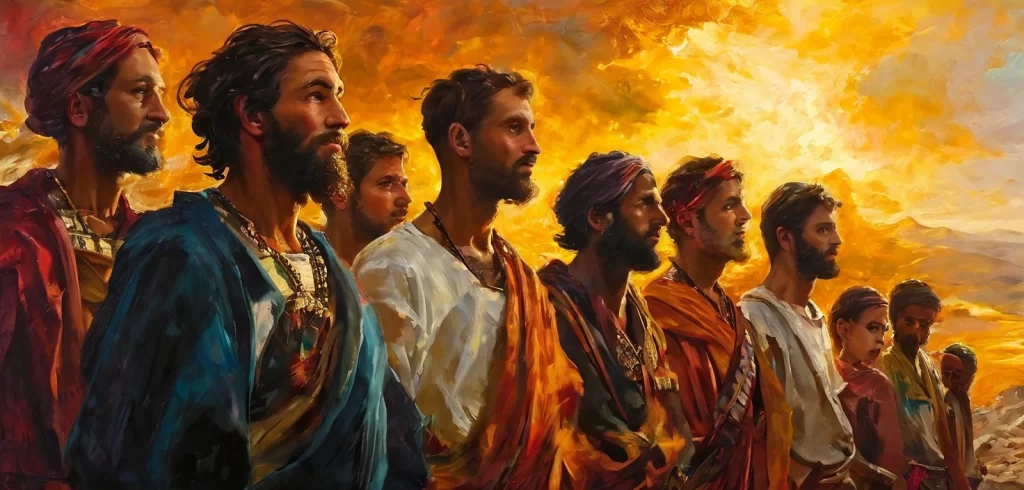
The story of Joseph is particularly remarkable. Sold by his brothers into Egypt, Joseph becomes a powerful man and, through his wisdom and faith, saves his family from famine. The reconciliation between Joseph and his brothers is a symbol of redemption and divine grace, and Joseph’s story becomes a precursor to the ultimate redemption that God promised to his people.
The 12 Tribes of Ishmael – The Prophecy Unfolded
As the tribes of Israel settle in the promised land, Ishmael’s line also expands and diversifies. Ishmael, the son of Abraham and Hagar, marries and has 12 sons, each of whom becomes the leader of a tribe. The names of Ishmael’s sons are: Nebaioth, Kedar, Adbeel, Mibsam, Mishma, Dumah, Massa, Hadad, Tema, Jetur, Naphish, and Kedemah. These names, rich in meaning, reflect the cultural and geographical heritage of the Ishmaelite tribes.
The tribes of Ishmael settled in the Arabian Peninsula, where they exerted a profound cultural and religious influence. The city of Mecca, for example, became an important religious and commercial center, and the Kaaba, the holiest site in Islam, was traditionally associated with the figure of Ishmael.
The promise made to Abraham that Ishmael would become a great nation was fulfilled through the expansion and influence of the Ishmaelite tribes. Ishmael’s heritage is preserved in Islamic traditions, where he is revered as a prophet and an important ancestor.
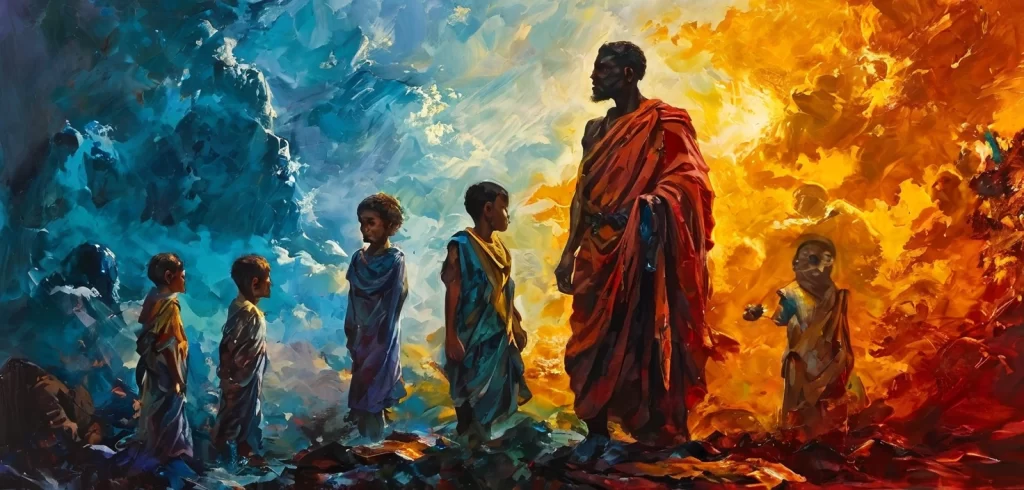
The Influence of the Tribes of Ishmael and Israel on History and Culture
The tribes of Ishmael and Israel, although distinct, have had a profound impact on the history and culture of the Middle East and the world. The Ishmaelite tribes, with their strategic presence in the Arabian Peninsula, facilitated trade and cultural exchange between East and West. The influence of the Ishmaelite tribes is evident in the traditions, language and religion of the region.
On the other hand, the tribes of Israel, with their covenant with God and their religious heritage, gave rise to Judaism, one of the oldest and most influential religions in the world. Judaism, with its sacred scriptures, traditions and faith, has profoundly influenced Christianity and Islam, establishing a spiritual and cultural connection between the three major monotheistic religions.
Ancestral Rivalries and the Search for Peace
The history of the tribes of Ishmael and Israel is marked by conflicts and rivalries that have persisted over the centuries. Territorial disputes, cultural differences, and divergent interpretations of religious traditions have contributed to tensions between the two lineages. These rivalries, while leaving deep scars, have also inspired ongoing efforts to achieve peace and reconciliation.
The search for understanding and peaceful coexistence is a recurring theme in the history of the tribes. The figure of Joseph, with his ability to forgive and reconcile with his brothers, is a powerful example of how reconciliation can overcome division. Likewise, the heritage of Ishmael, with its emphasis on hospitality and community, offers a vision of unity and cooperation.
The Contemporary Relevance of the Narratives of Ishmael and Israel
The stories of the tribes of Ishmael and Israel continue to be relevant in the contemporary world. In a context of globalization and cultural diversity, understanding the historical and religious roots of these narratives can promote dialogue and understanding between different cultures and religions.
The reconciliation between the tribes of Ishmael and Israel, symbolized by the figure of Joseph, offers an important lesson for the modern world. The search for peace and understanding, although challenging, is essential for harmonious coexistence between nations and peoples.
Conclusion
The story of the 12 tribes of Ishmael and Israel is a rich and complex narrative, marked by divine promises, ancient conflicts, and distinct destinies. The lives of Abraham, Sarah, Hagar, Isaac, and Ishmael are testaments to God’s faithfulness and the complexity of human relationships. The Ishmaelite and Israelite tribes, with their distinct heritages, have contributed significantly to the history and culture of the Middle East and the world.
The relevance of these narratives transcends time and space, offering valuable lessons of faith, hope, and reconciliation. The search for peace and understanding, symbolized by the stories of Joseph and the reconciliation between the tribes, continues to inspire generations and offer hope for a better future.
The 12 tribes of Ishmael and Israel, with their intertwined stories, remind us of the importance of understanding and valuing cultural and religious diversity. They challenge us to seek peace and unity in a world often divided by conflict and differences. And, most importantly, they inspire us to trust in God’s promises and to live with faith and hope.
Epilogue
In a world where historical and religious narratives often intertwine with contemporary reality, the stories of the tribes of Ishmael and Israel continue to resonate. They remind us of the importance of seeking peace, understanding, and unity in an often divided world. The divine promises, the lives of the patriarchs, and the heritage of the tribes teach us that despite our differences, there is a fundamental unity that connects us to one another.
The journey of the 12 tribes of Ishmael and Israel is one of faith, hope, and reconciliation. It is a journey that calls us to look to the past, understand the present, and build a better future. And in the end, it is a journey that reminds us that despite adversity, God’s promise of a great nation and a blessed inheritance continues to unfold.
Tags: 12 tribes, Ishmael, Israel, Abraham, faith, biblical history, divine promises, patriarchs, religious narrative, Abraham and Sarah, Ishmael and Isaac, biblical families, reconciliation, God’s promise, descendants, cultural heritage, religious history, ancestral conflict, legacy, Middle Eastern history, historical roots, divine covenant, biblical figures, monotheistic religions, faith and hope, peace and understanding, religious culture, ancestral rivalry, spiritual traditions, story of Joseph, tribes of Israel, tribes of Ishmael, biblical geography, religious conflict, Mecca, Kaaba, Arabian Peninsula, Islam, Judaism, Christianity, spirituality, historical reconciliation, unity, search for peace, cultural history.


